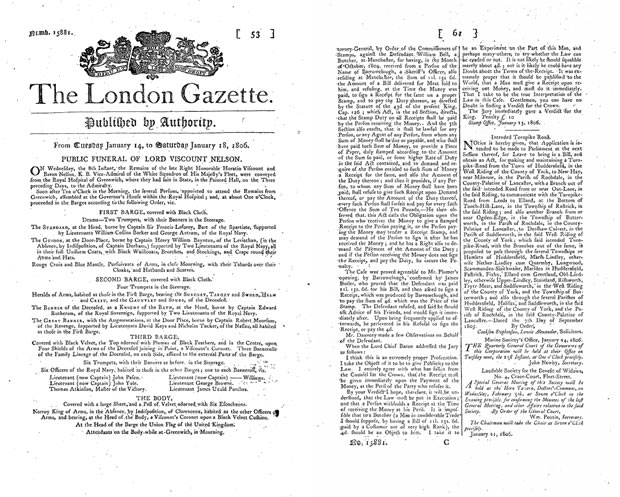This month in history: The funeral of Horatio Nelson
As well as recording the deeds of Britain's armed forces, The Gazette has also captured snapshots of the lives of "all classes of men". Nowhere is this better illustrated than in The Gazette number 15881, published on Tuesday 14 January 1806, in which the public funeral of Lord Horatio Nelson is detailed in the most exacting terms. Of particular note is a description of the funeral car as being "decorated with a carved imitation of the head and stern of His Majesty's Ship the Victory, surrounded with escutcheons of the arms of the deceased, and adorned with appropriate mottos and emblematical devices." The contrast with some of the less salubrious affairs of the age could not be more pronounced. Take the case of "His Majesty's Attorney-General" versus one William Bell.
A Manchester-based butcher by trade, Bell had aroused the ire of the Crown by refusing to sign a receipt "on a proper stamp" for 11l 15s 6d paid to him by a Sheriff"s Officer named Barrowclough. The Gazette reports that statute 43d of the "present King" directs that "stamp duty on all receipts shall be paid by the person receiving the money."
In his summing up, the judge made his view of the matter very clear: "I think this is an extremely proper prosecution. I take the object of it to be to give publicity to the law. I entirely agree with what has fallen from the Counsel for the Crown that the receipt must be given immediately upon the payment of the money, at the Peril of the Party who refuses it."
He went on to add that he considered it "impossible" that a "man in considerable trade" would find the duty sum of 4d an "object" and concluded that it was an "experiment on the part of this man, and perhaps many others; to try whether the law can be evaded or not."
For his part, the unfortunate Bell was not shown the clemency romantic notions of a country in mourning might expect. The jury found him guilty and issued a "10 penalty " a considerable sum at the end of the 18th century. What became of Mr Bell after this event is unknown; but Nelson's name would go on to be woven into British folklore as the naval genius who sacrificed himself for "God and my country."

